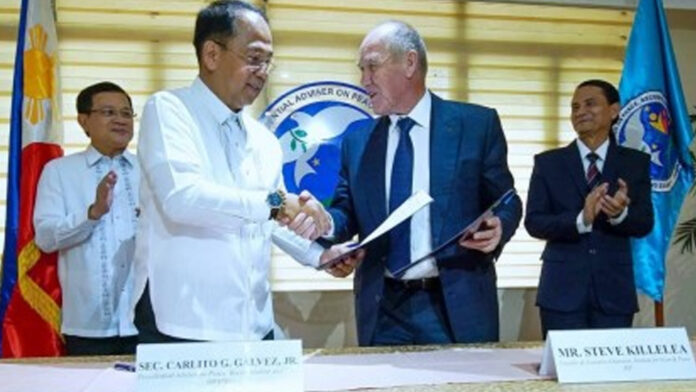The Office of the Presidential Adviser on Peace, Reconciliation and Unity (OPAPRU) on Wednesday said the formalization of its partnership with globally-recognized Institute for Economics and Peace (IEP) showcases its commitment to strengthen evidence-based peacebuilding and conflict resolution in the country.
In a statement, OPAPRU Secretary Carlito Galvez Jr. said the signing of the memorandum of understanding (MOU) with IEP on Monday is a major step in the Philippines’ quest to achieve long-lasting peace, embedding data-driven strategies at the heart of its peacebuilding efforts.
He said the research and data analysis tools provided by IEP to OPAPRU, such as the Global Peace Index (GPI) and the Positive Peace Framework, have helped enhance the implementation and monitoring of OPAPRU’s peace programs.
Galvez said the initial meetings with IEP paid dividends as the MOU with the organization will allow the OPAPRU to push forward with its peacebuilding and development efforts to even greater heights.
“With the OPAPRU and IEP working together, we look forward to strengthening our policies and programs on conflict prevention, peacebuilding, and community resilience, as well as the implementation of capacity-building programs, training sessions, and policy dialogues that seek to empower our local governments and communities,” he added.
Galvez assured that the OPAPRU is committed to assisting the IEP in providing accurate and detailed information for their research that will allow other agencies to effectively and efficiently utilize this data.
“The OPAPRU shall also continue its efforts to integrate peace metrics into our national and local policies to make them more peace-oriented and further improve the efficacy of our peace interventions,” he said.
Galvez said the partnership will “further strengthen our collaboration and boost our capability to support other government agencies in developing and monitoring data-driven peacebuilding strategies and interventions.”
“I am confident that this partnership will not only enhance our conflict-sensitive and peace-promoting programs initiatives but also inspire increased collaboration between and among local and international organizations,” the OPAPRU chief added.
Meanwhile, IEP country representative Crisostomo Bas Jr. thanked the OPAPRU for closely working with the body and making use of its expertise, particularly in the critical area of measuring the impact of peace interventions.
Bas said the MOU “will pave the way for more relevant and practical undertakings of programs, projects, and activities that are anchored on OPAPRU’s vision of a just and lasting peace.”
Founded in 2007, the IEP has become a major global voice shaping discussions around security, defense, terrorism, and development. From its Sydney headquarters, the IEP has expanded internationally since its inception, establishing regional hubs in New York, Brussels, the Hague, Mexico City, and Nairobi to facilitate outreach, education, and partnership development.
As a pioneer institution in the research and study of the concepts of negative and positive peace, the IEP has also focused on peace as a concept that can be measured.
“We have provided metrics for measuring peace and uncovered the relationships between business, peace, and prosperity, and this is all made within the context of arriving at a better understanding of the cultural and economic factors that create peace,” Bas said.
The IEP’s development of crucial tools such as the GPI and the Positive Peace Index (PPI) allows for the assessment of a nation’s levels of peacefulness and the extent of its efforts in cultivating and sustaining its peacefulness, respectively.
Utilizing 23 qualitative and quantitative indicators, the GPI evaluates the state of peace by examining societal safety and security, the prevalence of ongoing conflicts, and the level of militarization.
Notably, the GPI also calculates the financial burden of violence, which currently stands at USD19.1 trillion globally. The Philippines accounts for USD55.9 million of this cost, equivalent to 3.3 percent of the nation’s gross domestic product and roughly PHP25,000 per Filipino each year, as a consequence of conflict. (PNA)






